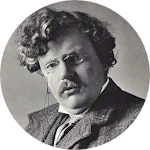Introductory Note:
In short, I had always believed that the world involved magic: now I thought it perhaps involved a magician. – G.K. Chesterton
There is no Christian book, aside from the Bible, that has influenced my faith as much as G.K. Chesterton’s Orthodoxy. From first word to last I was enchanted by new (to me) ideas about this Christian life – that it is full of wonder, full of paradox, full of fun! One of the passages that has most stuck with me is one excerpted below (from Devotional Classics). I read Orthodoxy as the mother of a very young child, and was well-versed in the “abounding vitality” and “exultation in monotony” which children possess. The idea that this vitality might be expressed as a constant encore in nature by a Father who has not “sinned and grown old” was thoroughly delightful to me. Since that time, I have never witnessed a sunrise or a crocus blossom or the silent fall of snow without whispering to myself, “Do it again!”
Justine Olawsky
A False Assumption
All the towering materialism which dominates the modern mind rests ultimately upon one assumption; a false assumption. It is supposed that if a thing goes on repeating itself it is probably dead; a piece of clockwork. People feel that if the universe was personal it would vary; if the sun were alive it would dance. This is a fallacy even in relation to known fact. For the variation in human affairs is generally brought into them, not by life, but by death; by the dying down or breaking off of their strength or desire.
A man varies his movements because of some slight element of failure or fatigue. He gets into an omnibus because he is tired of walking; or he walks because he is tired of sitting still. But if his life and joy were so gigantic that he never tired of going to Islington, he might go to Islington as regularly as the Thames goes to Sheerness. The very speed and ecstasy of his life would have the stillness of death. The sun rises every morning. I do not rise every morning; but the variation is due not to my activity, but to my inaction.
Heaven’s Encores
Now, to put the matter in a popular phrase, it might be true that the sun rises regularly because he never gets tired of rising. His routine might be due, not to a lifelessness, but to a rush of life. The thing I mean can be seen, for instance, in children, when they find some game or joke that they specially enjoy. A child kicks his legs rhythmically through excess, not absence, of life. Because children have abounding vitality, because they are in spirit fierce and free, therefore they want things repeated and unchanged. They always say, “Do it again”; and the grown-up person does it again until he is nearly dead. For grown-up people are not strong enough to exult in monotony.
But perhaps God is strong enough to exult in monotony. It is possible that God says every morning, “Do it again” to the sun; and every evening, “Do it again” to the moon. It may not be automatic necessity that makes all daisies alike; it may be that God makes every daisy separately, but has never got tired of making them. It may be that He has the eternal appetite of infancy; for we have sinned and grown old, and our Father is younger than we.
The repetition in Nature may not be a mere recurrence; it may be a theatrical encore. Heaven may encore the bird who laid an egg. If the human being conceives and brings forth a human child instead of bringing forth a fish, or a bat, or a griffin, the reason may not be that we are fixed in an animal fate without life or purpose. It may be that our little tragedy has touched the gods, that they admire it from their starry galleries, and that at the end of every human drama man is called again and again before the curtain. Repetition may go on for millions of years, by mere choice, and at any instant it may stop. Man may stand on the earth generation after generation, and yet each birth be his positively last appearance.
Repeated Exercises of Someone’s Will
This was my first conviction; made by the shock of my childish emotions meeting the modern creed in mid-career. I had always vaguely felt facts to be miracles in the sense that they are wonderful: now I began to think them miracles in the stricter sense that they were willful. I mean that they were, or might be, repeated exercises of some will.
In short, I had always believed that the world involved magic: now I thought that perhaps it involved a magician. And this pointed a profound emotion always present and sub-conscious; that this world of ours has some purpose; and if there is a purpose, there is a person. I had always felt life first as a story: and if there is a story there is a story-teller.
But modern thought also hit my second human tradition. It went against the fairy feeling about strict limits and conditions. The one thing it loved to talk about was expansion and largeness. Herbert Spencer would have been greatly annoyed if anyone had called him an imperialist, and therefore it is highly regrettable that nobody did. But he was an imperialist of the lowest type. He popularized this contemptible notion that the size of the solar system ought to overawe the spiritual dogma of man.
Why should a man surrender his dignity to the solar system any more than to a whale? If mere size proves that man is not the image of God, then a whale may be the image of God; a somewhat formless image; what one might call an impressionist portrait. It is quite futile to argue that man is small compared to the cosmos; for man was always small compared to the nearest tree.
The Universe Is a Priceless Jewel
Stories of magic alone can express my sense that life is not only a pleasure but a kind of eccentric privilege. I may express this other feeling of cosmic coziness by allusion to another book always read in boyhood, “Robinson Crusoe,” which I read about this time, and which owes its eternal vivacity to the fact that it celebrates the poetry of limits, nay, even the wild romance of prudence.
Crusoe is a man on a small rock with a few comforts just snatched from the sea: the best thing in the book is simply the list of things saved from the wreck. The greatest of poems is an inventory. Every kitchen tool becomes ideal because Crusoe might have dropped it in the sea. It is a good exercise, in empty or ugly hours of the day, to look at anything, the coal-scuttle or the bookcase, and think how happy one could be to have brought it out of the sinking ship on to the solitary island.
The trees and the planets seemed like things saved from a wreck: and when I saw the Matterhorn I was glad that it had not been overlooked in the confusion. I felt economical about the stars as if they were sapphires (they are called so in Milton’s Eden): I hoarded the hills. For the universe is a single jewel, and while it is a natural cant to talk of a jewel as peerless and priceless, of this jewel it is literally true. This cosmos is indeed without peer and without price: for there cannot be another one.
The Magic Has a Meaning (and Someone to Mean It)
I felt in my bones; first, that this world does not explain itself. It may be a miracle with a supernatural explanation; it may be a conjuring trick, with a natural explanation. But the explanation of the conjuring trick, if it is to satisfy me, will have to be better than the natural explanations I have heard. The thing is magic, true or false.
Second, I came to feel as if magic must have a meaning, and meaning must have some one to mean it. There was something personal in the world, as in a work of art; whatever it meant it meant violently.
Third, I thought this purpose beautiful in its old design, in spite of its defects, such as dragons. Fourth, that the proper form of thanks to it is some form of humility and restraint: we should thank God for beer and Burgundy by not drinking too much of them. We owed, also, an obedience to whatever made us.
And last, and strangest, there had come into my mind a vague and vast impression that in some way all good was a remnant to be stored and held sacred out of some primordial ruin. Man had saved his good as Crusoe saved his goods: he had saved them from a wreck. All this I felt and the age gave me no encouragement to feel it. And all this time I had not even thought of Christian theology.
Excerpts taken from Devotional Classics: Selected Readings for Individuals and Groups (Richard J. Foster & James Bryan Smith, Editors. HarperCollins, 1993.).
Photo Copyright: Tatiana Kostareva
Text First Published January 1908 · Last Featured on Renovare.org November 2021


